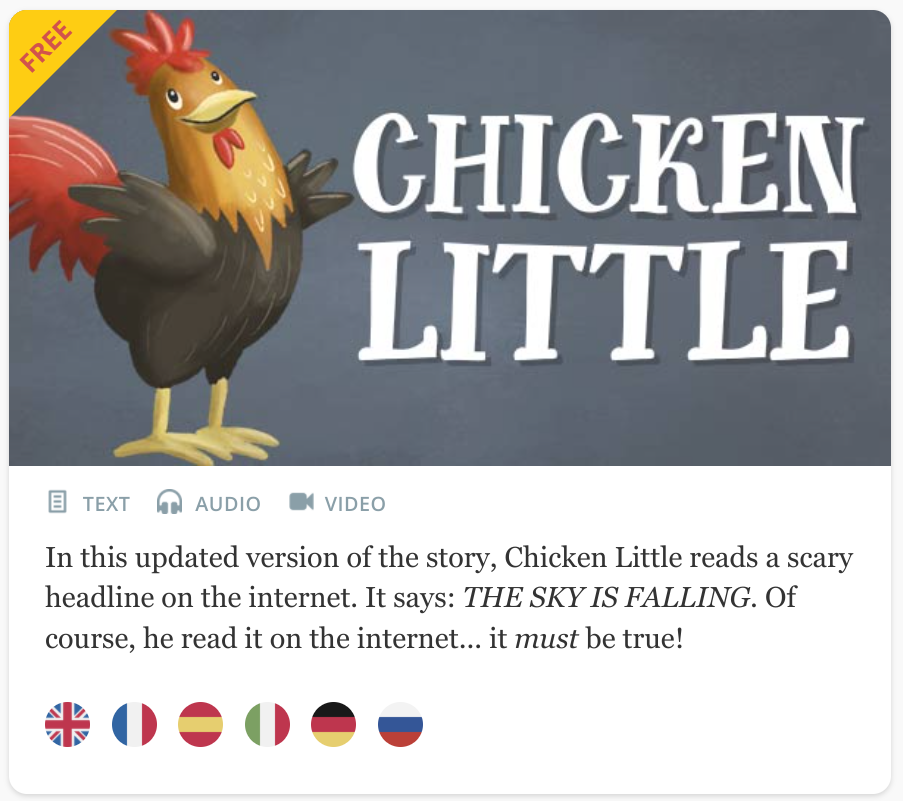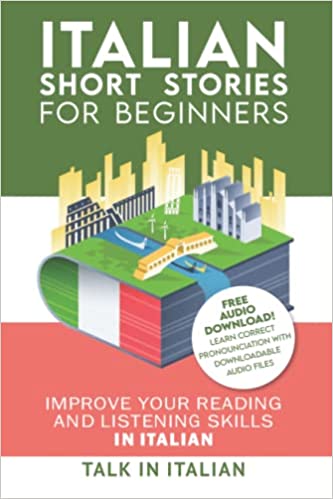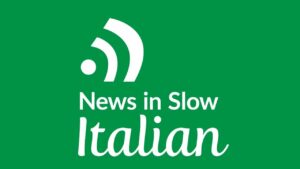Short Stories in Italian
C'era una volta, una persona che voleva imparare l'italiano.
As an avid reader and someone who's learned a different language, let me tell you, reading short stories is about as close to a perfect tool to help you pick up Italian as you can get!
Reading and listening to stories lets you practice using basic words, but they also allow you to learn new vocabulary and natural sentence structure with entertaining and practical examples, not just lists from a grammar worksheet.
Not to mention the variety! Italy has produced some of the most famous authors around; many of whom have written short stories! Being able to read Dante's "Divina Commedia", Pirandello's "Il Fu Mattia Pascal", or "Il Nome Della Rosa" by Eco in their original language doesn't have to be a pipe dream! Italian short stories are some of your best friends when it comes to learning new language skills.
So, grab yourself a snack and a nice cozy place to relax. Here's the rundown of what you need to know about Italian short stories!
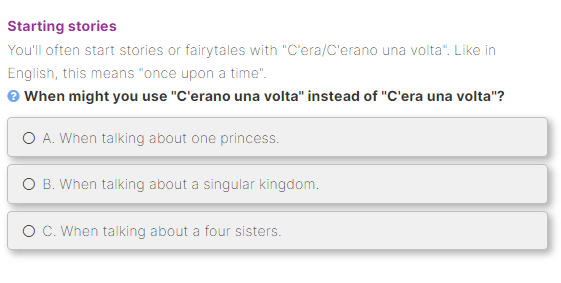
Prologue
Before we jump right into the different sorts of Italian short stories you have at your disposal to help you learn the language, let's look at a few common things you can expect to find when you read these tales in Italian.
FAQ: What's the greatest Italian literature ever written?
Italy has contributed many classics to the literary world. Some of the most famous are I promessi sposi (The Betrothed), Il Decameron, La Divina Commedia, and more!
The dreaded Italian subjunctive and storytelling
I know, I know, you probably thought you were safe from the subjunctive here. After all, this mood is used for hypothetical or possible situations, and, usually, short stories are completely fictional, right? What's more hypothetical than that? Unfortunately, you'll still have to deal with the subjunctive, and understand what it's trying to tell you or you might completely misunderstand part of the story.
Don't panic! While you might still be getting used to the subjunctive, don't let it scare you off!
Look at it this way, have you ever read a book or heard a story and felt connected to a character as if they were your friend? The subjunctive mood is a great tool authors can use to do that! By having a character in a story say something like "Se io non fossi stato là" (If I hadn't been there), it makes it seem like the characters have lives outside of the story you're reading. They'll feel like real people you want to hang out with!
Just look at the following examples. They're from completely fictional stories, but don't they make it seem like you're learning about real people?:
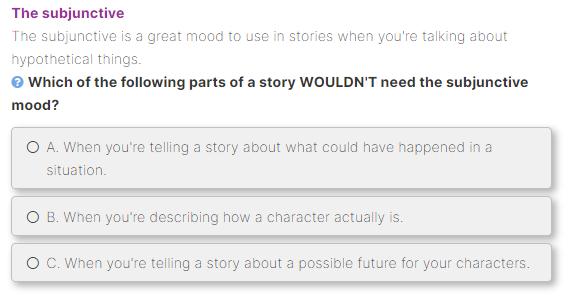
If you're interested in getting a handle on the subjunctive so you can use this mood to tell engaging stories, check out our Italian Subjunctive for Beginners article if you haven't already!
Publishing dates
You won't have any trouble finding short stories in Italian to read, let's make that clear. There are so many wonderful authors out there and so many short story collections, you could read a new one literally every day and never run out. However, if you want to read short Italian stories written by Italian authors, then you should keep in mind that newly published stories may be a little harder to find.
While classic Italian literature like Goldoni, Manzoni, and Boccaccio are great and absolutely deserve to be read, if you're just starting to learn the language they probably shouldn't be your first choice. They're written in old Italian that you might have some trouble understanding. Honestly, it can be really similar to Latin, which is a whole different beast, trust me. Even contemporary classic authors like Umberto Eco and Italo Calvino can be hard to read when you're just starting out. These books are classics for a reason, they're timeless. However, timeless doesn't necessarily mean easy to read.
I know plenty of native Italian speakers who struggle with reading classic Italian authors! No matter how much of a reader you are in your first language, when it comes to Italian, like any other language, you have to walk before you can run. You wouldn't tell someone who's just starting to learn English to read Shakespeare, right?
Now that you've got the basics of what you need to know before you start reading Italian short stories, let's look at what sorts of stories you can use to help you learn the language yourself!
Fables and Fairy tales
Fables and folklore are a huge, and I mean huge, part of Italian culture. Every little village and there are thousands, has its own unique legends and fables that are passed down for centuries. If you're just starting to learn how to read in Italian, tales are a great place to start.
Most of these stories are intended for children, so you can find simplified Italian short stories to read that are great for grown-up beginners, too!
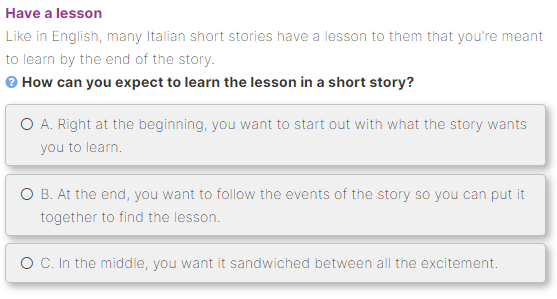
FAQ: What famous children's stories are from Italy?
Pinocchio is the most famous children's story to come out of Italy. However, there are many others that Italian children love. Il libro cuore, for example, is a beloved children's novel that is often read in elementary or primary school.
The familiar
If you're very new to learning Italian, or you're in the mood for a little childhood nostalgia, you're in luck. Tons of your favorite fairy tales and fables are likely just as popular among Italian children, so they'll be easy to find!
Fables like "The Three Little Pigs" (I Tre Porcellini), for example, are classics around the world which make them fantastic short story starting points.

(05:53-05:58) Non importa con quanta forza soffiasse, la casa non si muoveva.
Familiar stories like these that you probably know by heart no matter how long it's been since you last heard them, make learning grammar topics easier since you already have an idea of the storyline. While you may not recognize every single word, you can use what you already know about the story as a foundation. They're also super short which means you don't have to set aside that much time to listen to them. This fact makes them perfect for fitting language learning into your packed schedule.
If you want to start learning Italian while using some classic fairy tales you might have grown up with yourself, check out websites like Grimm Stories where you can read public domain Grimm fairy tales in Italian for free. You don't even have to be online to read them, you can download PDF files directly from the website for so you read whenever you want!
Italian fables
There are obviously plenty of children's stories that are unique to Italy if you're in the mood to really immerse yourself in Italian culture while you learn the language. You might even know some of them already. Salgari's "Sandokani" was made into a cartoon, for example.
Not to mention Pinocchio (Le Avventure di Pinocchio) by Carlo di Collodi was a hugely popular Italian children's book before it became a Disney story, you know!
If you're ready to move on to actual Italian short stories for children, check out websites like Lingua Booster where you can catch up with your old friend Pinocchio in his original language.
Or, you can even check out places like The Fable Cottage where you might find a few other short stories that are completely new to you! You can even listen along while you read since a lot of these sites offer free audio tracks.
Stories to Learn Italian
If children's stories aren't your speed, or if you want to read things that are more streamlined that help you learn Italian as a second, third, or fourth language, then there are plenty of options for you! If you've never learned a language outside of a classroom before, you might not know about the different types of book formats there are that are specifically designed to help you pick up whatever new language you want to learn.
FAQ: Can you learn Italian by reading?
Reading is often considered one of the best ways to learn any language, including Italian. However, this isn't a guarantee. If you don't like to read, or you're more of an audio learner, you might learn better using other methods such as listening to TV shows, movies, or audiobooks.
Books and stories for beginners
Beginner language books are a great starting point if you want to completely dive into learning Italian. These books have the same sort of vibe as kids' books because they're usually short with simple sentences and maybe even a picture or two. However, they're a little more mature if you're concerned that children's books might be too juvenile for you.
These story collections are pretty straightforward, so no matter which one you pick, there won't be any surprises. Usually, you'll find a list of new words and definitions and sometimes a couple of grammar notes for more difficult stories. You can even find collections of stories that come with audio files if you're an audiobook lover (don't worry, in my book, that still counts as reading!).
A good example to check out is Italian Short Stories for Beginners by Talk in Italian (afflink: available on Amazon). The stories are just a page or two long, so there won't be any crazy twists in the plot and such, but they are written entirely in Italian and present everyday situations that are great for learning useful vocabulary.
Lingo Mastery also has a popular series of easy Italian short stories (afflink: available on Amazon) that follow a similar format.
If you don't have it in your budget to purchase a book right now, or if you'd rather try out this format first before you commit to filling your library with books, websites like Learn Italian Online offer a few short stories you can try out for free.
I know, I know, I've been focusing a lot on reading short stories. I'm a bookworm, it's in my nature! However, if you're more of an audio learner, you can find plenty of educational YouTube videos with short, easy-to-follow, original, short stories that are meant to help Italian learners.
"Fun and Easy Italian" is a great channel for these sorts of stories. The creator offers multiple videos of original short stories created for people who aren't native Italian speakers. You can just put one on and listen while you go about your business, or you can read along onscreen. An example of the short stories you can find on the channel is "I Due Vasi" (The Two Vases) that is just a few minutes long.
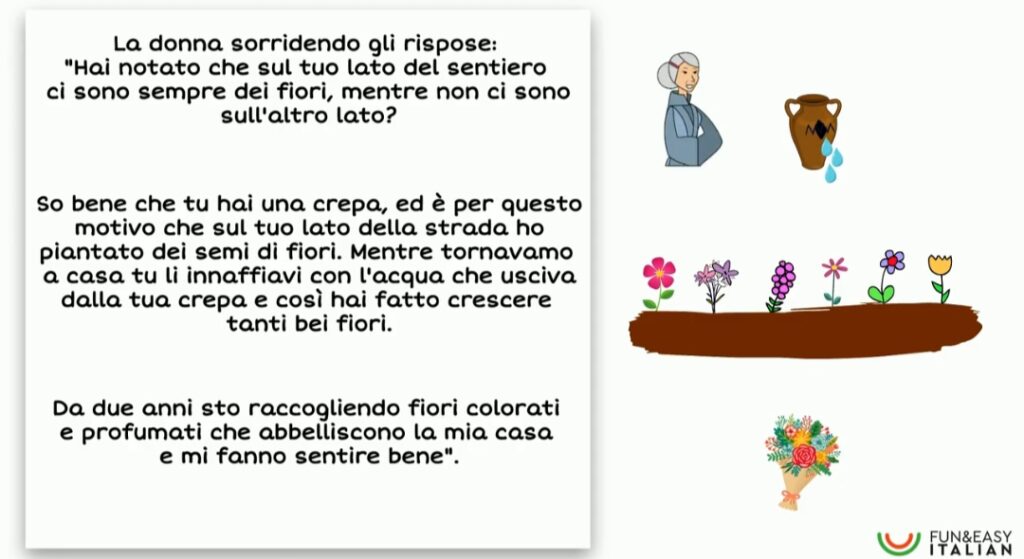
(01:52-02:38) Da due anni sto raccogliendo fiori colorati e profumati che abbelliscono la mia casa e mi fanno sentire bene.
Parallel language books
Parallel language books are another popular go-to format for reading in a new language. These books may seem like they're only meant for beginners since you have your language to fall back on, but there are tons of books for even advanced learners. Since you can rely on your first language, you can read more complex stories that might have been too difficult to read for someone who's just learning Italian.
Nota Bene: Remember how I said you wouldn't want to read classic Italian literature as a beginner? If you can find a parallel language book, that becomes a lot more possible!
"Penguin's Short Stories in Italian" (afflink: available on Amazon) is a great collection of stories by Italian authors you can read in parallel text format. That's just one example, though! You're just a simple search away from finding all the Italian-English parallel books you could ever want to read in any genre you want.
In fact, if you're itching to start parallel reading right away, websites like Ercole Guidi offer a handful of free Italian-English parallel text stories from popular English, American, and Italian authors.
Advanced Short Stories
If you're up for a challenge or if you want to show off how far along you are on your Italian language journey, you can start reading short stories that were intended for native Italian speakers.
Dino Buzzati's works have become famous around the world. I have a collection of his short stories that have been translated into English myself, for example. He's a pretty contemporary writer compared to some of the famous Italian short story authors you might find, and his stories aren't dry or full of tons of complicated words. While his stories weren't written for Italian beginners exactly, they are written in a more modern Italian language that is usually simple to follow and they tend to have short sentences with generally easy-to-understand vocabulary. I've recommended "Dal Medico" before with a lot of good results.
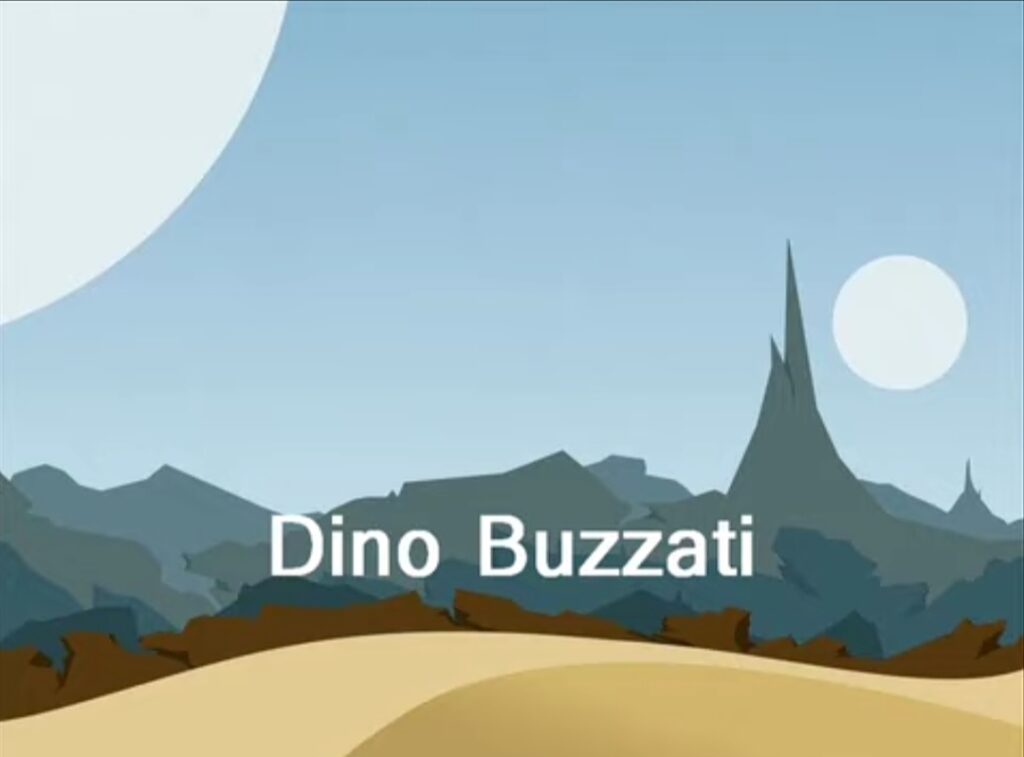
(07:29-07:44) Ci sono oggi nazioni immense, tutte fatte di morti.
While this is definitely the most challenging type of short story education out there, there are ways to make it easier. Check to see if there are any Italian translations of your favorite short stories or writers. That way, you're sort of combining both the "familiar story" learning method and the "parallel text" learning method to create a trifecta for reading in Italian, which might make this process a little easier.
FAQ: Who is the most famous Italian author?
Dante Alighieri is, unsurprisingly, the most famous Italian author. Since he wrote "Volgare" in an old version of Italian, if you plan to read his work is its original form, it's recommended you wait until you're at an advanced level of Italian.
Epilogue
Learning to read in a new language is an uphill battle, but it's also an exciting adventure! As much as you might be tempted to jump into long novels, short stories are a wonderful tool you can use to your advantage while you learn Italian.
It doesn't matter if you just started learning Italian today or you've been working on your Italiano for a year, there's a way you can use short stories to help. From fairy tales and fables, to books written for Italian language students, or to tackle complex story collections, each option has its own set of advantages that can guide you. You can build up your skills little by little. Just be patient and you'll be reading like a fluent Italian speaker before you know it!
As they say: E vissero felici e contenti.
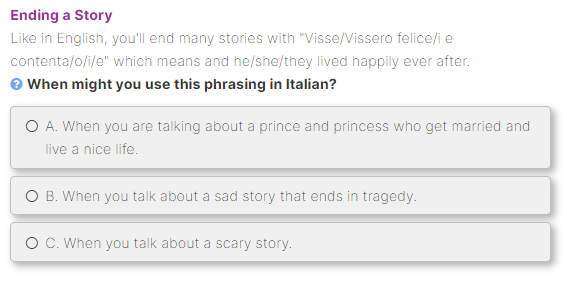
FAQ: Do Italians like to read?
Italians are a diverse population regarding how much they enjoy reading. In general, however, it's considered a popular hobby. There are many places where you can find books in Italy, and it's not uncommon to find people bringing books with them to the beach or on train rides, just like in other countries!
